Happy New Year!
... or Happy New Year when we get to that!
The year 2014 has almost past and I would like to celebrate the top 10 reading experiences.
I was going for 5, because it seemed a bit silly to choose 1/3 part of the books I have read this year, but I couldn't do that! It was hard to choose between my little darlings! It was hard enough to put a number on them.
It might not be in accordance with stars I gave them, but this is not the top 10 best books, this is the top 10 reading experiences - is there a difference? Yes, there is!
And here they are...
#10
-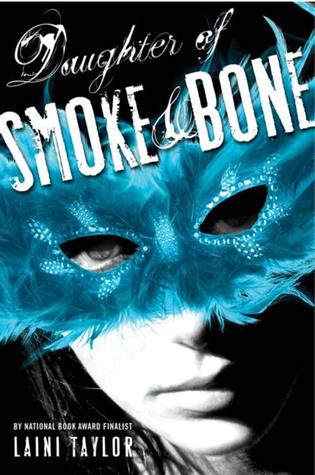
5 stars - Daughter of Smoke and Bone written by Laini Taylor in 2011.
#1 in the series of the same name.
I am beginning to be a bit tired of YA paranormal romances - they are getting weirder and weirder, trying to make it original. I, however, always wanted to read this one because I love the cover. Very pretty. One day it was for sale for the silly price of about 10 American dollars (very, very cheap in Denmark - not kidding!), so I bought it, had it on my shelf for a while and then gave it a go.
It is, as I predicted, weird... but I liked it. Strangely enough.
I like the characters Kauro and Akiva (although it took some time to like Akiva, the hero in this book). I remember that I not only cried to this book - I wept - I am not the crying type, so for that at least that should give it a place on the list!
#9
-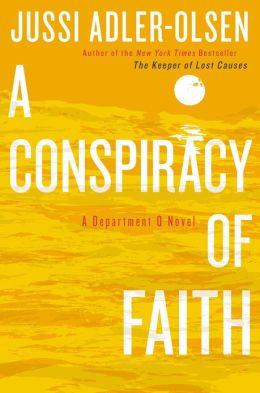
4½ stars - A Conspiracy of Faith (original titel: Flaskepost fra P) written by Jussi Adler- Olsen in 2009.
#3 in the series Department Q.
Finished this not long ago and, although, my earlier review I wrote that I missed a big plot twist, I still gave it 4½ star and that is because I found it funny - I laughed out loud several times - exciting so my heart some times skipped a beat and horrifying in the good way. Just as the crying-thing, I do not get goosebumps of excitement when I am reading, so again, this deserve to be on the list.
#8
-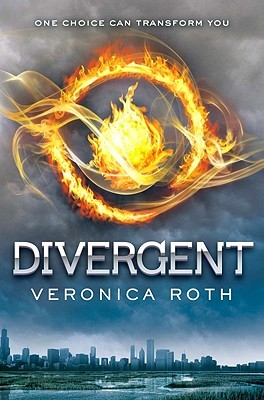
5 stars - Divergent written by Veronica Roth in 2011.
#1 in the series of the same name.
As much I am tired of YA paranormal romances, as much I love YA dystopia (doesn't make sense - does it?), but I am afraid dystopia books are beginning to follow the same pattern as the others. Getting weirder and weirder just to be original. Therefore it took a lot of time and stubbornness before I began this one, but everyone said it was great. Then came the movie and I liked that, so I tried. And I am glad!
Tris is not a crybaby as all the other heroine. She's a kick-ass! I like the war-theme and the action. A nice change. I couldn't lay it down, even though I just had seen the movie and therefore knew what will happen. I liked there where some differences with the movie - it is never fun if it is an exact copy.
I am definitely going to read the series and it may be one of my new favorites. I don't think it is going to be worse and the first book will be the only good (I have that feeling with a lot of book series)
Again, this on deserve a spot on the list.
#7
-
5 stars - The Rosie Project written by Graeme Simsion in 2013.
#1 in the series Don Tillman.
I have hardly ever laughed so much, than I did when I read this book! Ever watched the TV series Big Bang Theory? There is a character named Sheldon Cooper, who is a genius and the price for that is his lack of social knowledge. The main protagonist Don Tillman is a little bit like him. I guess the biggest difference about those two is that Don is not asexual.
It is heartwarming romance without being corny and it is really, really funny! I mean, come on! The man makes a survey to found candidates for "project wife" - sophisticated, healthy and just as OCD as himself. And that is clearly not the result he gets!
I hope they will make it to a movie and I would buy it! I have shelfed it as one of my favorites. It clearly belongs to the list!
#6
-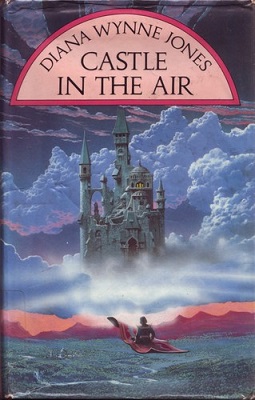
4½ stars - Castle in the Air written by Diana Wynne Jones in 1990.
#2 in the series Howl's Moving Castle.
A thing I miss, with all those new fantasy novels, is the good old "Once upon a time"-fantasies. Not meaning the words should be included, but the feeling that what you read is a true fairy-tale story. I watched the anime movie Howl's Moving Castle and loved it like everybody else. I read the first book - I fell even harder. Now after I finished the second - I still just as much in love.
I wrote this in a review on my goodreads-account:
"It may not feel like a sequel, but fear not! Our beloved Howl, Calcifer and Sophie are all in it, and more than we think! The language is beautiful and witty, and the plot twist is great!"
As said, it may not feel like a sequel; because the settings and the main characters are not the same as the first book, but don't let it fool you. It is a sequel!
Why is Castle in the Air higher up on the list, than some of the books I gave more stars? Because I judged the book after my opinion of Howl's Moving Castle, which I gave a higher rate. Is the sequel just as good as the first? Of course not! Therefore I could "only" give it 4½ star. But it is better than The Rosie Project.
If I should compare my ratings with all my other ratings, I would need a scale from at least 1-100.
#5
-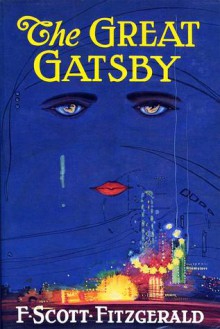
5 stars - The Great Gatsby written by F. Scott Fitzgerald in 1925.
I really love the writing style of this book. It is delicate and poetic. I feel with Gatsby and understand the narrator Nick. I haaaate Daisy. Cannot see what so great about her, but thanks to the progress of the book I don't feel misplaced by hating her.
What I really like is the message in the book. American Dream is dead. Gatsby says once: "Her voice is full of money" and I read this from an analysis of the quote:
"the point is that money isn't something you can separate from the body. If you're born with money, you're actually born with money. That's why everyone knows Gatsby's faking it."
I like to read a book I can analyze until I faint of exhaustion.
That is why this book gets to be my number 5.
#4
-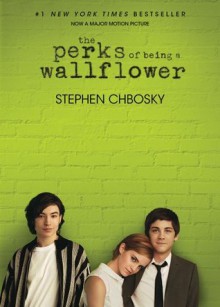
5 stars - The Perks of Being a Wallflower written by Stephen Chbosky in 1999.
Just like I can keep on analyze The Great Gatsby, the same I can with The Perks of Being a Wallflower!
I was sceptical about this one. I thought it was another one of these "it is so hard to be a teenager"-books (I don't normally like those), but actually it was without being it also. Charlie is a positive person and says some really sad things, without even know it himself (which sometimes made it funny). And that is one of the elements, that makes it a good book-club book.
I really found it enjoyable to read a sentence and know that what I read, has another meaning. Nothing is a coincidence! It has many depths. I mean, the books Charlie reads has a meaning! He never tell us the meaning, he just mentions the titles here and there, so I have enjoyed to analyse the meaning.
Charlie is a different character, but I still felt some things I could relate to him - e.g. the feeling of being a part of a group. I knew what he was talking about.
This book was one of my biggest positive surprises I have had in all my time with a book.
It deserves a high rank!
#3
-
4½ stars - Yahya Hassan written by Yahya Hassan in 2013.
This is a collections of poems from a Palestinian immigrant in Denmark. Poems are not very popular in Denmark, but there was a gigantic hype because of this. The poems a written in CAPITAL LETTERS and are about Yayha Hassan's life as immigrant, criminal and his hard childhood with an abusive father. The biggest hype there was, was his critic about Islam. Either people in Denmark hate him or love him.
I hate his personality - he is provoking just to be provoking, if you ask me - but I really like a lot of his poems. I do not like poems, so that in itself is an achievement. Some of his poems made me cry.
And I respect him for bringing a topic on the debate. Because of some earlier crises with criticizing Islam, we in Denmark have started to be a bit scared to say anything bad about it, because we are afraid of the reactions from the Muslims and Yayha Hassan has also had to pay the prize for publishing this - he's got death-threats, so now he is protected by bodyguards and also some other things.
I respect he dares. Not saying Islam is bad - of course it is not, but there a good and bad sides of every religion.
His rhythm is a bit weird, but original. I would recommend this to every Dane!
He put some thoughts into my head for a very long time, and for that he gets to be number 3 on my rank.
#2
-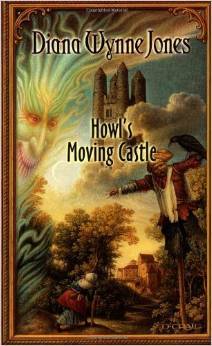
5 stars - Howl's Moving Castle written by Diana Wynne Jones in 1986.
#1 in the series of the same name.
This book has a special place in my heart. I read this the first time last year 2013 and when I read the second this year, I just had to reread it again, and I am sure it will not be the last time I'll read it again!
If you think the anime movie is great, then you will find the book supercalifragilisticexpialidocious (wrong movie, but when in need of a better word, this is perfect!). The language is authentic to the old classic fairy-tales and you really get the "Once upon a time"-feeling. It is witty and I do love the characters so much. They are all funny in their own way (although Calcifer and Howl beat the others).
I love everything about it! It might be my all-time favorite children's book.
Definitely a top 2 book!
#1
-
5 stars - Salmon Fishing in the Yemen written by Paul Torday in 2006.
Okay... I seriously love this book! I did not expect that, but I do. The themes are countless: integrity, terrorism, identity, faith, science, politic, religion, middle-east/europe, war and soldiers, marriage in crisis and, not to forget, love. All these themes can be related to salmons... SALMONS!!? This author has a way of thinking that is unique and absolutely brilliant!
I loved it by the first pages, and it was really a turn-pages book.
Not only Torday's way of thinking is unique, his narration style is too!
You see, the book's narration is not traditionel. This is supposed to be actually proofs. There are diaries excerpt, mail korrespondance (for example between Al-Quada members), unpublished autobiographic excerpts, articels, manuscript for a televison-show and so on and so on. But the diaries excerpts actually give you a feeling, that you are reading a real book, with dialogues and all that kind of stuff. It may not be the first book, using this style, but it felt unique and original.
The humor is fantastic! I love how stupid Peter Maxwell is and I love the email korrespondance between dr. and mrs. Jones.
The ending was a REALLY suprise! Even if you have seen the movie, you will be suprised. I mean it!
All in all one of the most original, funny and greatest books I have read for a long time!
I know people will think "Salmon? Serously? That sounds boring!"
Y-O-U A-R-E W-R-O-N-G!!!!
This is really my favorite book - not only for the year - of all time!!
Every separate argument I have given for the following 9 books can all be used again in this book. It was hard to choose the following books place on the list, but this one wasn't a hard one at all! I knew this would be my number 1!
Those were my best readings of the year! I am looking for the next year.
Happy New Year and good luck!
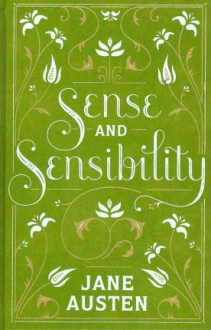

 Log in with Facebook
Log in with Facebook 





















